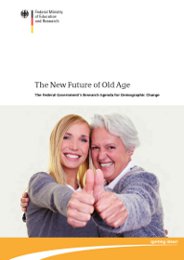The New Future of Old Age

Hardly any development will come to characterize Germany as much in the coming years as demographic change. While there is little we can do about an ageing and shrinking population in the short term, we can still take an active part in shaping the consequences of demographic change. Along with the worlds of industry, science and society, political decision-makers are therefore tasked with setting a course that safeguards prosperity and social cohesion.
The Federal Government has hence moved demographic change to the top of its political agenda and is the first German Federal Government ever to have presented a crossdepartmental analysis of current and expectable population developments, and their consequences for individual fields of policy, in its "Federal Government Report on the Demographic Situation and Future Development of the Country". In addition to this we have also described the measures that we have implemented so far to shape a demographically changed society.
Nevertheless there remain many open questions about the future, including the need to clarify what kind of society we wish to live in in the future, how we can foster intergenerational equity and solidarity, and how the social participation of seniors can be enhanced. The research agenda in hand serves us to pick up on fields of action where research and innovation can contribute to the development of solutions for the challenges posed by an ageing population.
The research agenda is a milestone on the way to a comprehensive demographic strategy. The Federal Government is formulating this strategy on the basis of the aforementioned demographic report. Coordinated, implementation-oriented and sustainable policies give us every reason to look ahead to our country’s future with confidence.


